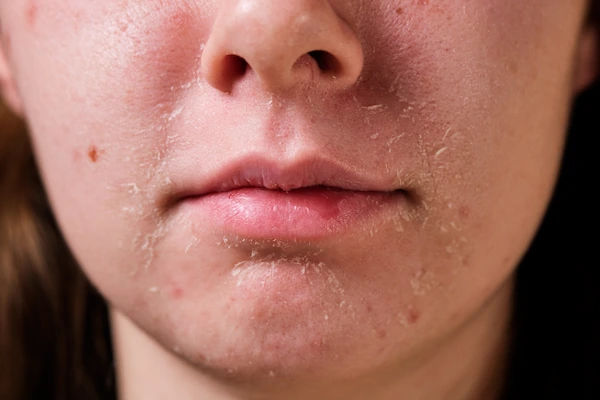Simple Skin Care Guide for Dry Skin
Discover easy and effective skin care tips to keep dry skin nourished, healthy, and hydrated every day.

Written by Dr. Siri Nallapu
Reviewed by Dr. D Bhanu Prakash MBBS, AFIH, Advanced certificate in critical care medicine, Fellowship in critical care medicine
Last updated on 13th Jan, 2026

Introduction
Does your skin often feel tight, itchy, or look flaky no matter how much lotion you use? You're not alone. Millions struggle with dry skin, a condition that can be both uncomfortable and frustrating. The world of skincare is vast and often overwhelming, with countless products promising miracles. But what if the secret to happier, healthier skin isn't more complexity, but less? This guide cuts through the noise to bring you a truly simple skin care routine built on dermatologist-approved principles. We'll explore what causes dry skin, break down a foundational 3-step routine, and provide lifestyle tips to help you achieve lasting comfort and radiance. If you're ready to transform your dry skin from a daily annoyance to a source of confidence, you've come to the right place.
What Does Dry Skin Really Mean?
Dry skin (or xerosis) occurs when your skin lacks the oils (lipids) it needs to retain moisture and protect against external aggressors. Think of your skin's outer layer as a brick wall; the skin cells are the bricks, and lipids are the mortar that holds them together. When there's not enough mortar, the wall becomes weak, allowing moisture to escape and irritants to enter.
Dry Skin vs. Dehydrated Skin: Knowing the Difference
This is a crucial distinction. Dry skin is a skin type, meaning it's a chronic condition characterized by a lack of oil. Dehydrated skin is a condition where your skin lacks water, and it can happen to any skin type, even oily skin. You can have both simultaneously. Dehydrated skin often looks dull and may show more pronounced fine lines.
Common Signs and Symptoms of Dry Skin
- A feeling of tightness, especially after cleansing or showering.
- Rough or scaly texture to the touch.
- Redness and irritation.
- Itching (pruritus), which can be intense.
- Flaking, peeling, or ashy appearance (common in darker skin tones).
- In severe cases, fine cracks or fissures may develop.
Consult a Dermatologist for the best advice
The 3-Step Simple Skin Care Routine for Dry Skin
Forget the 10-step routines. For most people with dry skin, consistency with these three core steps is far more effective than a complex, unpredictable regimen.
Step 1: Gentle Cleansing (Without Stripping)
The goal of cleansing is to remove dirt and impurities without damaging your skin's delicate moisture barrier. Avoid harsh, foaming cleansers with sulfates (like SLS), which strip natural oils.
What to use: Opt for creamy, hydrating, or oil-based cleansers. Look for keywords like "hydrating," "cream," "milky," or "balm" on the label. Ingredients like ceramides and hyaluronic acid in a cleanser are a bonus.
How to do it: Use lukewarm water, never hot. Gently massage the cleanser onto your skin for 60 seconds, then rinse thoroughly and pat dry with a soft towel. Don't scrub.
Step 2: Locking in Moisture (The Hydration Hero)
This is the most critical step for managing extremely dry skin. A good moisturiser does two things: it adds water (hydration) and then seals it in (occlusion).
What to use: Thicker creams and ointments are better than thin lotions. Look for powerhouse ingredients:
- Hyaluronic Acid: A humectant that can hold 1000x its weight in water, pulling moisture into the skin.
- Ceramides: These replenish the natural "mortar" in your skin's barrier.
- Glycerin: A classic, effective humectant.
- Petroleum Jelly or Shea Butter: Excellent occlusives to lock everything in.
How to do it: Apply your moisturiser to slightly damp skin immediately after cleansing or showering. This helps trap water on the surface.
Step 3: Daily Sun Protection (Non-Negotiable)
UV radiation is a primary cause of skin damage and can significantly worsen dryness and break down collagen. Sunscreen is not just for the beach.
What to use: Choose a broad-spectrum sunscreen with an SPF of 30 or higher. For dry and sensitive skin, mineral sunscreens (with zinc oxide or titanium dioxide) are often less irritating than chemical ones. Many modern mineral formulas are no longer thick and white.
How to do it: Apply it as the final step in your morning routine, every single day, rain or shine.
Advanced Tips for Very Dry Skin
If the core routine isn't enough, these additions can provide extra relief.
The Power of Humidifiers
Dry air, especially from heating and air conditioning, sucks moisture from your skin. Using a cool-mist humidifier in your bedroom while you sleep can dramatically increase air moisture, preventing your skin from becoming dry and cracked overnight.
Weekly Treatments: Masks and Gentle Exfoliation
Hydrating Masks: Once a week, use a mask formulated with hydrating ingredients like honey, aloe, or oats to give your skin a deep moisture boost.
Exfoliation: Be very careful. Dry skin is fragile. If you must exfoliate to remove flaky patches, do it no more than once a week using a chemical exfoliant like lactic acid, which is hydrating, rather than a harsh physical scrub that can cause micro-tears.
Lifestyle Tweaks for Lasting Hydration
True skin health comes from both inside and out.
Diet and Hydration: You Are What You Eat (and Drink)
Water: While drinking water won't directly hydrate your skin, overall hydration is essential for bodily functions, including skin health.
Fats: Incorporate healthy fats into your diet. Avocados, nuts, seeds, and fatty fish (like salmon) are rich in omega-3 fatty acids, which help support your skin's lipid barrier.
Bathing Habits for Sensitive Skin
- Limit shower time to 5-10 minutes and use lukewarm water.
- Pat your skin dry instead of rubbing.
- Apply moisturiser immediately (within 3 minutes) after drying off to seal in moisture.
When to Seek Professional Help
While this simple skin care guide can manage most cases of dry skin, sometimes it's a symptom of an underlying condition like eczema, psoriasis, or a thyroid disorder. If your dry skin is severe, widespread, doesn't improve with over-the-counter methods, or is accompanied by a rash, intense redness, or infection, it's time to see a professional. If your condition does not improve after trying these methods, consult a dermatologist for a precise diagnosis and treatment plan.
Conclusion
Managing dry skin doesn't require a cabinet full of expensive products or a convoluted routine. The most effective strategy is often the simplest one: be consistent, be gentle, and focus on reinforcing your skin's natural barrier. By understanding the needs of your dry skin and adopting this straightforward, three-step approach supplemented by smart lifestyle choices, you can effectively combat tightness, flakiness, and irritation. Remember, skincare is a journey of listening to your skin. Start with these foundational steps, be patient, and you will be well on your way to achieving a comfortable, healthy, and radiant complexion. Your skin deserves simple, effective care.
Consult a Dermatologist for the best advice
Consult a Dermatologist for the best advice

Dr. Sonal Jain
Dermatologist
9 Years • MBBS, MD Dermatology, Venerology & Leprosy
Kolkata
MCR SUPER SPECIALITY POLY CLINIC & PATHOLOGY, Kolkata
(25+ Patients)

Dr. Kaushiki Hajra
Dermatologist
5 Years • MBBS,MD(D V & L)
Kolkata
VDC Clinic, Kolkata
(75+ Patients)

Dr. Kaushiki Hajra
Dermatologist
5 Years • MBBS, MD Dermatology, Venerology & Leprosy
Kolkata
MCR SUPER SPECIALITY POLY CLINIC & PATHOLOGY, Kolkata

Dr. Sree Lalitha V
Dermatologist
9 Years • MBBS, DDVL , FRGUHS , Fellowship in Cosmetology. Fellowship in Dermatosugery - national skin centre ,Singapore. University medal holder in postgraduation and national scholarship in IADVL dermacon 2017
Bengaluru
Apollo Medical Center, Marathahalli, Bengaluru

Dr. Madhab Datta
Dermatologist
5 Years • MBBS, MD (DVL)
Kolkata
Dr. Madhab Datta's Clinic, Kolkata
Consult a Dermatologist for the best advice

Dr. Sonal Jain
Dermatologist
9 Years • MBBS, MD Dermatology, Venerology & Leprosy
Kolkata
MCR SUPER SPECIALITY POLY CLINIC & PATHOLOGY, Kolkata
(25+ Patients)

Dr. Kaushiki Hajra
Dermatologist
5 Years • MBBS,MD(D V & L)
Kolkata
VDC Clinic, Kolkata
(75+ Patients)

Dr. Kaushiki Hajra
Dermatologist
5 Years • MBBS, MD Dermatology, Venerology & Leprosy
Kolkata
MCR SUPER SPECIALITY POLY CLINIC & PATHOLOGY, Kolkata

Dr. Sree Lalitha V
Dermatologist
9 Years • MBBS, DDVL , FRGUHS , Fellowship in Cosmetology. Fellowship in Dermatosugery - national skin centre ,Singapore. University medal holder in postgraduation and national scholarship in IADVL dermacon 2017
Bengaluru
Apollo Medical Center, Marathahalli, Bengaluru

Dr. Madhab Datta
Dermatologist
5 Years • MBBS, MD (DVL)
Kolkata
Dr. Madhab Datta's Clinic, Kolkata
More articles from Dry Skin
Frequently Asked Questions
Why is my skin still dry even when I moisturize?
This is a common frustration. It usually means your moisturiser isn't occlusive enough to prevent water loss, or you're not applying it to damp skin. Try switching to a thicker cream or ointment and applying it immediately after patting your skin dry post-shower.
What is the best moisturiser for extremely dry skin on the face?
Look for a fragrance-free cream (not a lotion) that contains a combination of humectants (like hyaluronic acid) to draw in water and occlusives (like shea butter or petrolatum) to seal it in. Ingredients like ceramides and cholesterol are also excellent for barrier repair.
Are there any natural remedies for dry skin?
Some natural oils like coconut oil or sunflower seed oil can be effective occlusives. However, they are not formulated with the balanced ratio of lipids that skin barriers need. For best results, use a well-formated moisturiser that contains these natural ingredients alongside scientifically proven ones like ceramides.
How can I fix dry, flaky skin without exfoliating?
Regular and proper moisturizing is often enough. As you consistently hydrate your skin, the healthy new skin cells will naturally push the flaky ones to the surface where they can shed on their own. Exfoliating dry skin can often do more harm than good.
When should I see a doctor about my dry skin?
If symptoms persist beyond two weeks despite consistent care, or if you experience severe cracking, bleeding, signs of infection (yellow crust, pus), or intense itching that disrupts your sleep, consult a doctor online with Apollo24|7 for further evaluation. It could be a sign of eczema or another medical condition.

